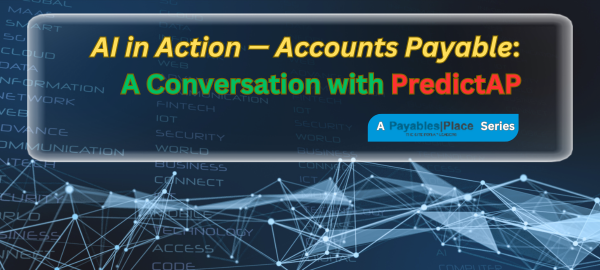A New AI Series on Payables Place
The power of artificial intelligence (AI) is undeniable. Its impact and influence are revolutionizing the Accounts Payable (AP) and Business-to-Business (B2B) payments automation market. According to research from Ardent Partners, AI will soon be ubiquitous in this sector, offering unparalleled efficiencies and capabilities. The transformative possibilities of AI will drive innovations in invoice processing, payment automation, fraud detection, and overall financial management, streamlining enterprise operations and improving business decision-making.
In view of these advancements, Ardent Partners is launching a special “AI in Action” interview series. Our “AI in Action” series represents an opportunity for our Chief Research Officer, Andrew Bartolini to sit down with senior executives at the ePayables solution providers that are focused on AI now and in the near-term and use these discussions as an opportunity to share their company’s focus on, expertise in, and vision for AI within the AP industry.
Today’s AI in Action profile features a conversation with David Stifter, Founder and CEO of PredictAP.
AB: Good day David, tell our readers a little bit about yourself.
I’m David Stifter, founder and CEO of PredictAP. Before starting PredictAP, I spent 20 years in real estate at Colony Capital, where I held various roles, but ultimately led accounting, finance, and technology. My focus was on making technology work for a large, global organization, which brought into sharp focus the complexities of accounts payable. Specifically, I encountered challenges with the ingestion and coding stages of the AP process, which is what ultimately led me to creating PredictAP. Over the course of my career, I’ve implemented solutions spanning the entire AP workflow, from ingestion to payment and bank reconciliation.

AB: Great background! I think I know your answer but let me ask anyway… what are the biggest opportunities for AI to improve AP and B2B payment efficiencies and productivity?
DS: I think that AI has transformative potential for AP in two critical areas: complex invoice coding and in creating an automated system of checks and balances.
Invoice coding is often one of the most labor-intensive and error-prone steps in the AP process. This is especially true in industries like real estate (our specialty at PredictAP) where coding rules vary greatly between organizations and even between individual teams. AI excels in identifying patterns and applying nuanced accounting decisions, like determining whether an expense should be categorized differently. Unlike traditional methods, which may only extract basic information like invoice totals or due dates, AI can handle complex decisions consistently and accurately across large datasets.
The second significant opportunity lies in using AI as an independent layer of validation, providing a technology-based check and balance system that ensures coding and other AP decisions are made optimally. Historically, this type of validation relied entirely on human oversight, which can be inconsistent and prone to errors. But AI can analyze data trends, spot anomalies, and flag potential issues in real time, offering a level of precision that manual methods often lack. For example, AI can detect hidden costs like late fees, which might otherwise be miscategorized as regular expenses, giving teams the opportunity to identify (and prevent) wasted resources.
Together, these capabilities not only save time and reduce errors but also empower AP teams to focus on strategic activities rather than mundane, repetitive tasks.
AB: How do you view your customers’ (and prospective customers’) AI attitudes?
DS: Attitudes have evolved dramatically in recent years. Before ChatGPT, there was a lot of skepticism around the actual capability of AI technology. Now, those attitudes have shifted to almost excessive optimism in some cases. Leadership often has high expectations for AI, seeing it as a transformative tool, which is great but must be tempered with realism — AI is powerful but not infallible.
On the other hand, workers who engage with AI day-to-day sometimes express fear of being replaced. I try to reassure them that AI is not at a stage where it can replace human jobs because it still lacks judgment and context. Instead, I try to frame it as an incredibly powerful tool; I like to say that AI is like an enthusiastic intern — it really wants to work hard for you, but it can and will make mistakes. That being said, it’s ultimately capable of handling repetitive tasks and freeing up time for those employees to focus on more valuable, meaningful work, and once they come to realize this, they tend to be more open to AI-powered tools.
AB: What are the leading AI subsets (e.g., machine learning, natural language processing, deep learning, etc.) with the biggest impact on accounts payable/B2B payment solutions? And why?
DS: The most impactful AI subset in accounts payable is machine learning, primarily because of its ability to identify and act on patterns in structured and semi-structured data. In AP, these patterns often dictate how invoices are coded, how payments are processed, and how discrepancies are resolved. Machine learning excels in these scenarios by learning from historical data and applying its understanding to new, unseen cases. For example, it can discern subtle coding nuances, such as how a specific expense should be categorized, even when these rules differ from invoice to invoice.
However, it’s essential to note that machine learning isn’t the only method with a role to play. Natural language processing (NLP) also has significant potential, particularly for interpreting unstructured data like emails or PDFs and extracting relevant details, such as payment terms or vendor notes. Similarly, deep learning can be leveraged in more advanced use cases, such as fraud detection, where identifying anomalies in massive datasets require a level of computational depth that simpler methods can’t achieve. Ultimately, I think that machine learning remains the cornerstone of our approach, because it aligns with the primary challenge in accounts payable: recognizing and acting on patterns within complex data.
AB: How are you ensuring the accuracy and reliability of customers’ AI models (AI data output)?
DS: I see accuracy and reliability as two distinct challenges: Accuracy heavily depends on the historical consistency of a customer’s data. Large organizations often struggle with this due to varying personal preferences and differences in how individuals handle tasks. AI can help by bringing more consistency to these processes. We backtest our models regularly and monitor predictions against outcomes, ensuring continuous improvement.
Reliability, on the other hand, is about how well AI integrates into real-world environments. We’ve invested heavily in seamless integration with AP systems to ensure our tools work under real-world conditions without disruption, even when faced with unexpected scenarios like new vendors or file errors.
AB: How do you plan to support your AP clients if/when an AI skills gap exists?
DS: The skill gap is an interesting challenge. On one hand, some AI tools, like those requiring prompt engineering, have a relatively low barrier to entry. This means users don’t need advanced technical skills to use them effectively. I often compare these to learning Excel — an essential skill that anyone can develop with time and practice.
Prompt engineering is becoming a similar must-have skill, and we encourage clients to invest in training their teams to refine prompts and ask the right questions to get the best results from AI tools. This helps them leverage AI effectively without feeling overwhelmed.
On the other hand, more advanced aspects of AI, such as model building, optimization, and integration, require deep technical expertise and specialized knowledge. That’s where we step in. At PredictAP, we’ve built a team that includes experts in AI research and development, including a professor who specializes in training Ph.D. students in AI methodologies. This level of expertise allows us to develop tailored, industry-specific solutions that clients can use without needing to navigate the complexities of AI themselves.
We also recognize that the gap between understanding the business problem and having the technical ability to solve it can be wide. Our solutions are designed to bridge that divide. For instance, our AI tools are built to integrate seamlessly into existing workflows, ensuring clients don’t have to reinvent their processes or invest heavily in technical skills to benefit from our technology.
Ultimately, our approach is about making AI accessible, practical, and empowering for AP teams. Whether it’s through simplifying tool usage, providing training, or leveraging our own expertise to deliver turnkey solutions, we aim to help clients close the skills gap and unlock the full potential of AI without adding undue complexity to their operations.
AB: Where do you see AI going within the ePayables (AP automation) market over the next five years?
DS: I’m excited about where AI is heading in this space. I think we’re going to see a rise in narrow, deep applications of AI that are tailored to specific industries. Fraud detection, in particular, will become increasingly important as bad actors use AI to exploit vulnerabilities in AP processes.
At the same time, I think that AI will make accounting processes more reliable and accurate, allowing organizations to modernize their payment workflows and optimize areas like rebates and operating efficiencies. Ultimately, it’s going to help us free up resources and enable companies to focus on strategic priorities while improving their overall performance.
AB: Last thing – Congrats on winning the 2024 AP Honors Award for Innovative Solution.
DB – Thank you – it’s a great honor, we’re very excited!
AB: We’ll dive into this award next time – for now, thanks for your time today.
DS: Thank you.

